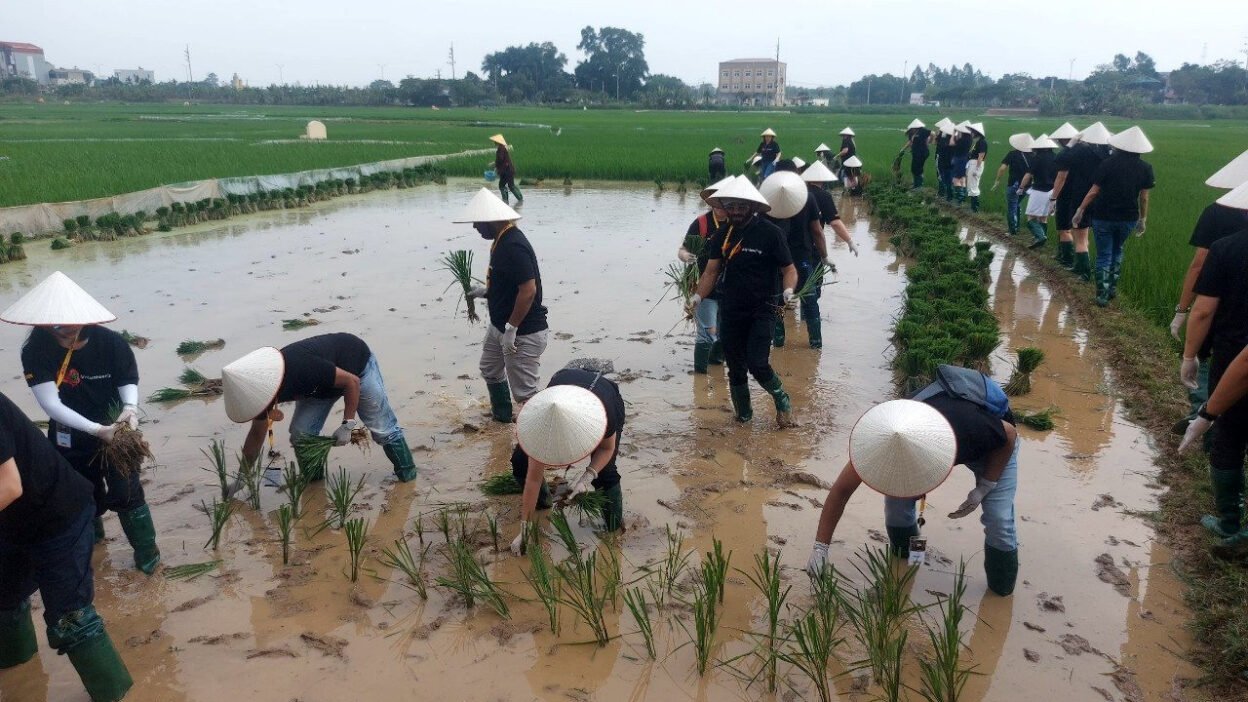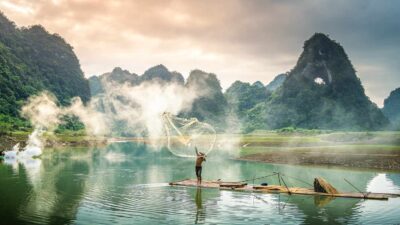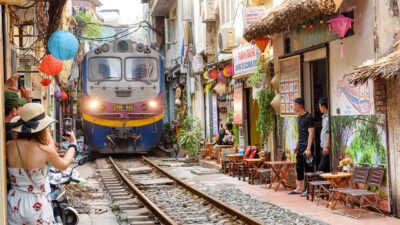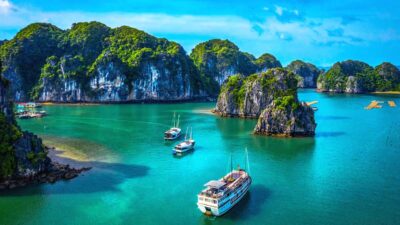Want to truly understand Vietnam? Forget the tourist traps—immerse yourself in local life with a Vietnam rural homestay tour. From lush rice terraces in the northern highlands to peaceful riverside villages in the Mekong Delta, these authentic experiences allow you to live, cook, farm, and share daily routines with Vietnamese families. Discover not just the sights but the soul of the countryside in the most meaningful way possible.
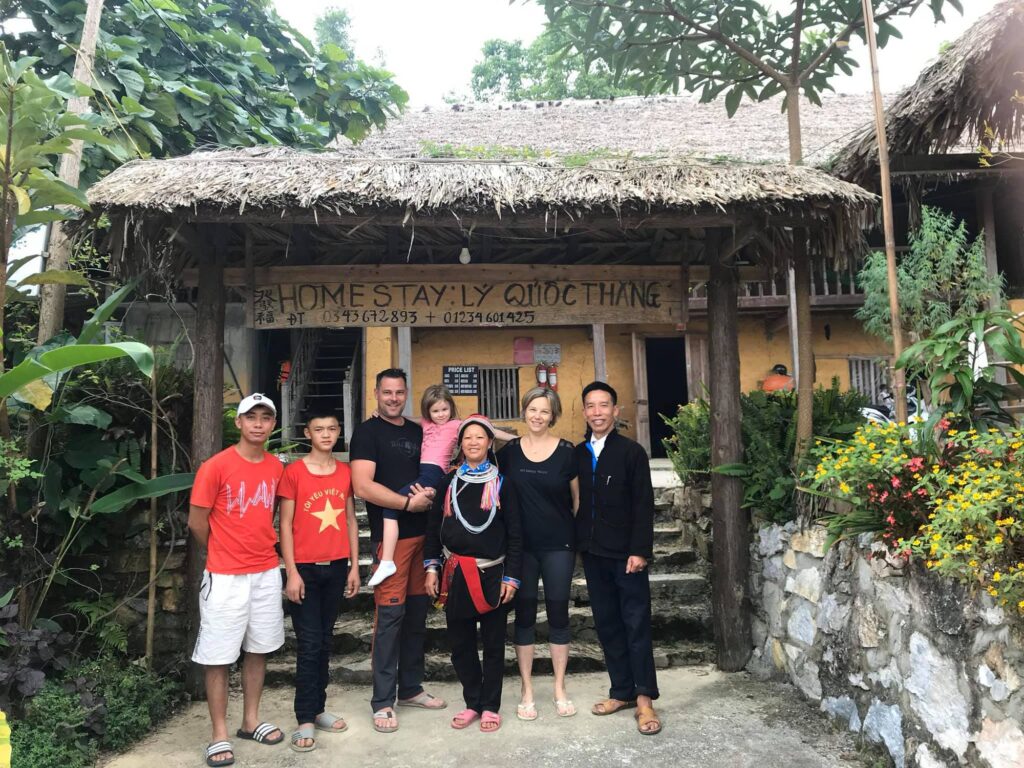
Why Choose a Vietnam Rural Homestay Tour?
When people think of Vietnam, iconic images of Ha Long Bay, the lantern-lit streets of Hoi An, or the hustle of Ho Chi Minh City often come to mind. But for a truly transformative and meaningful travel experience, nothing compares to a Vietnam rural homestay tour. This type of tourism takes you beyond sightseeing into the daily life of local farmers, artisans, and villagers across Vietnam’s picturesque countryside.
What is a Rural Homestay Tour?
A rural homestay tour involves staying in the homes of local families—usually in remote or agricultural regions—where you sleep, eat, and engage in community activities. These homes are often part of organized networks offering authentic, responsible tourism that benefits both the host and the guest.
Whether you’re harvesting rice in the Red River Delta, making herbal medicines with ethnic minorities in the highlands, or cooking dinner in a Mekong Delta kitchen, rural homestays let you become a part of the story—not just an observer.
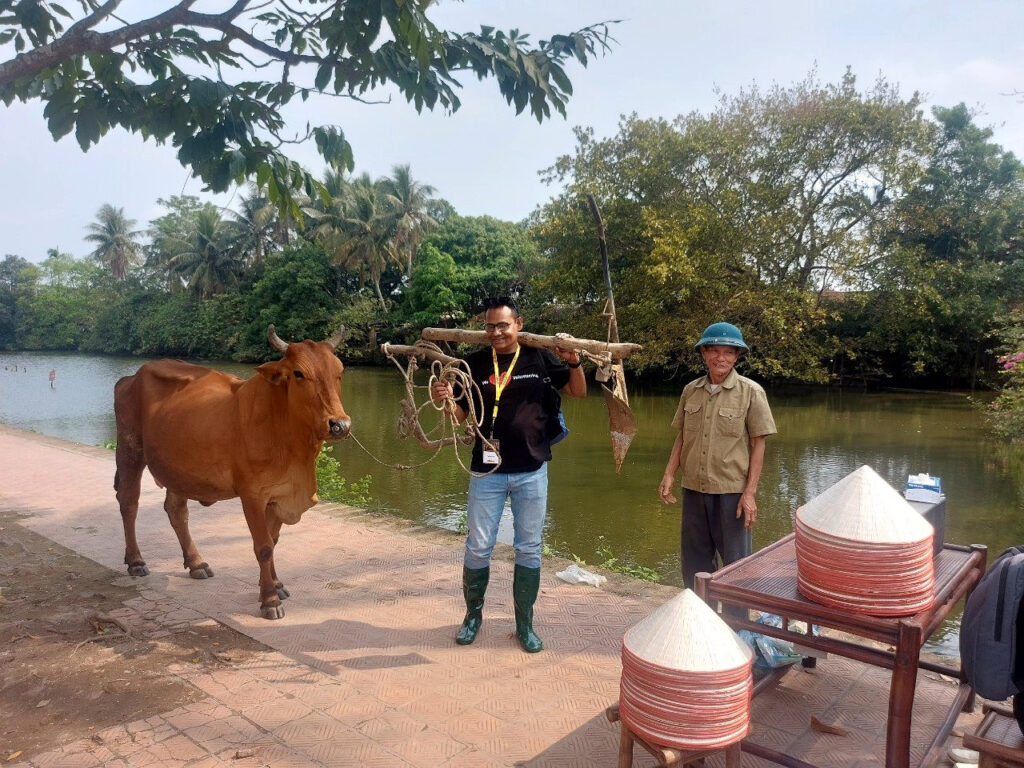
Top Regions for a Vietnam Rural Homestay Tour
1. Northern Highlands: Sapa, Ha Giang, and Bac Ha
This mountainous region is home to ethnic groups like the H’Mong, Dao, Tay, and Nung. Their vibrant traditional attire and resilient ways of life offer a deep cultural experience.
- Activities: Guided treks, herbal baths, weaving workshops, and local market visits.
- Accommodation: Wooden stilt houses with simple comforts and stunning views of terraced rice fields.
- Best time to visit: March–May (planting season) or September–October (harvest time).
2. Mai Chau & Pu Luong Nature Reserve
Nestled in a peaceful valley just a few hours from Hanoi, Mai Chau is an ideal introduction to Vietnam’s rural life.
- Activities: Biking through Thai villages, rice field walks, folk dance performances, cooking with your host.
- Special highlight: Bamboo weaving or staying in eco-lodges inside Pu Luong Nature Reserve.
3. Central Vietnam: Quang Nam & Phong Nha
The central provinces of Vietnam blend lush nature with traditional agricultural techniques and UNESCO heritage.
- Phong Nha: Stay near caves and national parks with options for jungle treks and farm-to-table dining.
- Tra Que (Hoi An): Learn how villagers organically grow herbs, ride buffaloes, and prepare local dishes.
4. Mekong Delta: Vinh Long, Ben Tre, Can Tho
Known as the “rice bowl” of Vietnam, this riverine region offers floating markets, fruit orchards, and delta culture.
- Activities: Boating through narrow canals, fruit-picking, cooking bánh xèo (Vietnamese pancakes), learning to weave water hyacinth.
- Accommodations: Riverside homestays or bungalows in lush gardens.
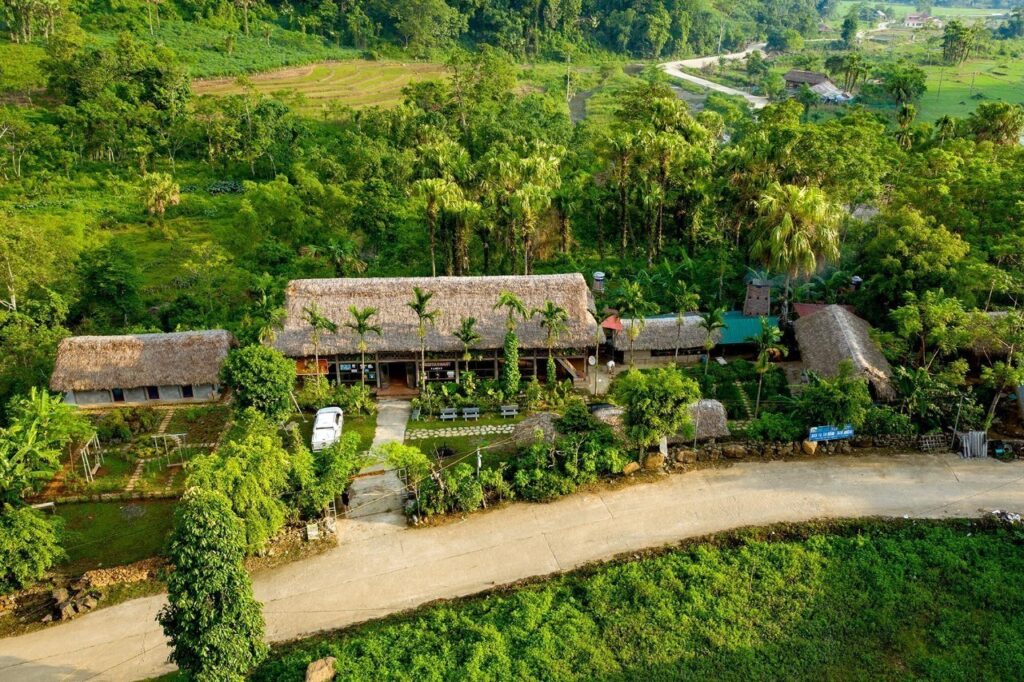
Expanded 12-Day Vietnam Rural Homestay Tour Itinerary
A Vietnam rural homestay tour offers a rare opportunity to experience the authentic charm of Vietnamese countryside life, beyond city lights and typical sightseeing. Below is a carefully curated 12-day itinerary designed for travelers seeking genuine cultural immersion, breathtaking nature, and the warm hospitality of local communities.
Day 1–2: Arrival in Hanoi → Transfer to Mai Chau (Northwest Vietnam)
After landing in Hanoi, Vietnam’s historic capital, you’ll transfer to Mai Chau, a tranquil valley nestled between emerald mountains, home to the Thai ethnic group.
- Homestay Experience: Settle into a traditional stilt house in a White Thai village.
- Cultural Immersion: Learn bamboo weaving from local artisans and join in preparing dinner using ingredients straight from the garden.
- Evening Delight: Enjoy a cultural show featuring ethnic music and graceful traditional dances under the starlit sky.
This experience sets the tone for the Vietnam rural homestay tour, offering a gentle introduction to village life and cross-cultural connection.
Day 3–4: Trekking in Pu Luong Nature Reserve
A short transfer takes you to Pu Luong, a lesser-known paradise filled with rice terraces, waterfalls, and ethnic minority hamlets.
- Nature & Adventure: Hike through rice paddies, bamboo forests, and hidden trails to reach remote hamlets.
- Local Crafts: See ancient water wheels in action and learn how they help irrigate the fields.
- Homestay Life: Spend the night in a thatched-roof stilt house, listening to nature’s sounds and sharing stories with your hosts.
These two days highlight Vietnam’s eco-tourism potential and the sustainability of rural life.
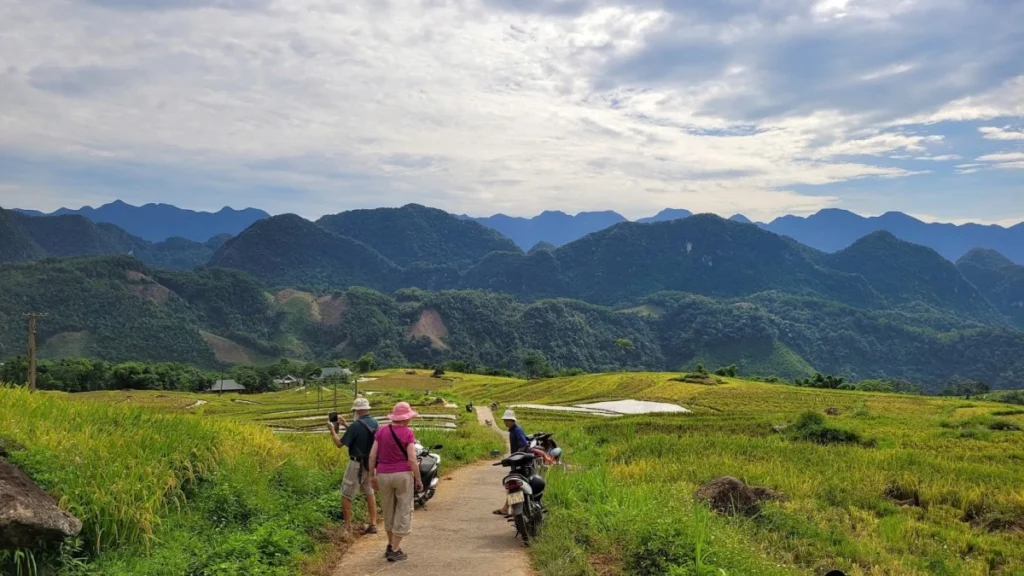
Day 5–6: Discovering Ninh Binh – “Inland Ha Long Bay”
Travel southeast to Ninh Binh, a landscape where towering limestone cliffs rise from winding rivers.
- Scenic Boat Ride: Sail on a small sampan boat through the lush waterways of Trang An or Tam Coc.
- Ancient Temples: Visit spiritual sites such as Bai Dinh Pagoda or the former royal capital of Hoa Lu.
- Cooking Class: Join your homestay family in preparing countryside dishes like grilled goat, mountain herbs, and rice cooked in bamboo tubes.
This leg of the tour showcases rural spirituality, cuisine, and geology in harmony.
Day 7–8: Sapa Highland Adventure via Overnight Train
Board the overnight sleeper train to Lao Cai, gateway to the misty mountains of Sapa—a region famous for its colorful hill tribes.
- Ethnic Connection: Stay with H’Mong or Dao families in remote villages. Learn how they farm on steep hills and dye fabric using indigo plants.
- Trekking Trails: Hike between villages like Lao Chai, Ta Van, or Y Linh Ho, surrounded by mountain views and rice terraces.
- Traditional Market: Browse vibrant weekly markets where locals trade buffaloes, crafts, and textiles.
Sapa’s homestay experience gives insight into highland survival, family roles, and indigenous traditions passed down for centuries.
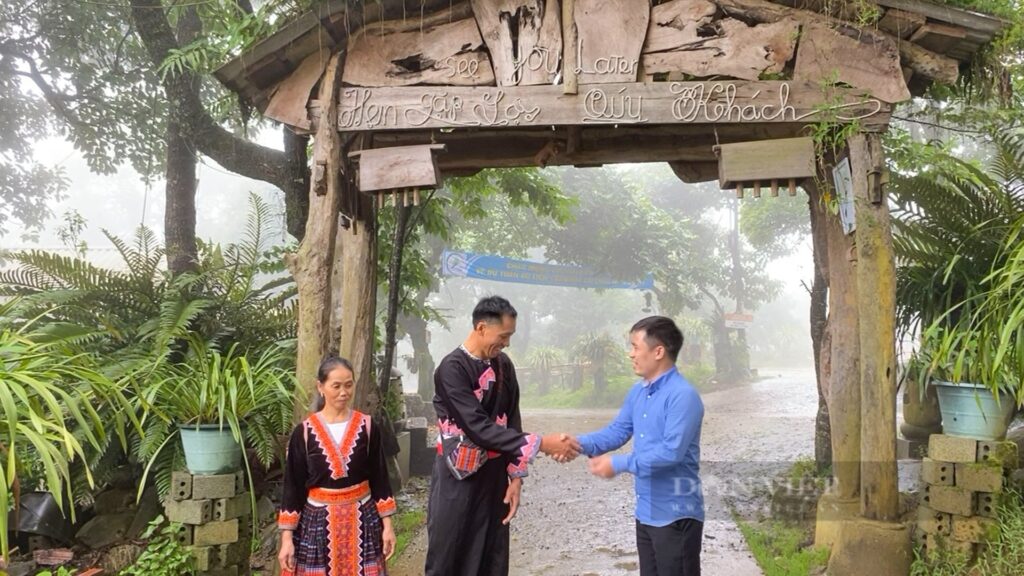
Day 9: Flight to Central Vietnam → Hoi An & Tra Que Village
Fly from Sapa (via Hanoi) to Da Nang, and transfer to Hoi An, a charming UNESCO town where culture and agriculture meet.
- Organic Farming: Visit Tra Que Herb Village, where farmers still use seaweed and buffalo dung to grow herbs.
- Hands-on Activities: Plow the land, plant lemongrass or basil, and harvest vegetables before preparing cao lầu, a signature noodle dish of the region.
- Riverside Homestay: Rest in a riverside homestay surrounded by lotus ponds and rice paddies.
Hoi An represents the blend of historical trading port elegance and rural Vietnamese farming.
Day 10–11: Fly to Can Tho → Homestay in the Mekong Delta
Next, fly to Can Tho, the beating heart of the Mekong Delta, where water is the lifeline of daily life.
- Floating Market Excursion: Rise early to visit Cai Rang Floating Market, where boats loaded with pineapples and vegetables form a floating bazaar.
- Village Life: Cycle through orchard-lined paths, cross monkey bridges, and pick tropical fruits like longan and pomelo.
- Craft Making: Learn how to make coconut candy, puffed rice, and banana chips with your hosts.
- Rural Homestay: Sleep in a simple yet comfortable riverside home, listening to the gentle lapping of the river under moonlight.
This portion of the Vietnam rural homestay tour immerses travelers in waterborne life and the vibrant biodiversity of the South.
Day 12: Return to Ho Chi Minh City (Saigon)
Conclude your rural immersion journey with a transfer to Ho Chi Minh City, Vietnam’s bustling economic center.
- Reflection: Use your final hours to write postcards, revisit your favorite memories, or shop for hand-crafted souvenirs.
- Optional Extension: Choose to extend your stay for a city tour or beach relaxation in Vung Tau or Mui Ne.
This marks the end of your Vietnam rural homestay tour, a life-enriching experience filled with community, culture, and connection.
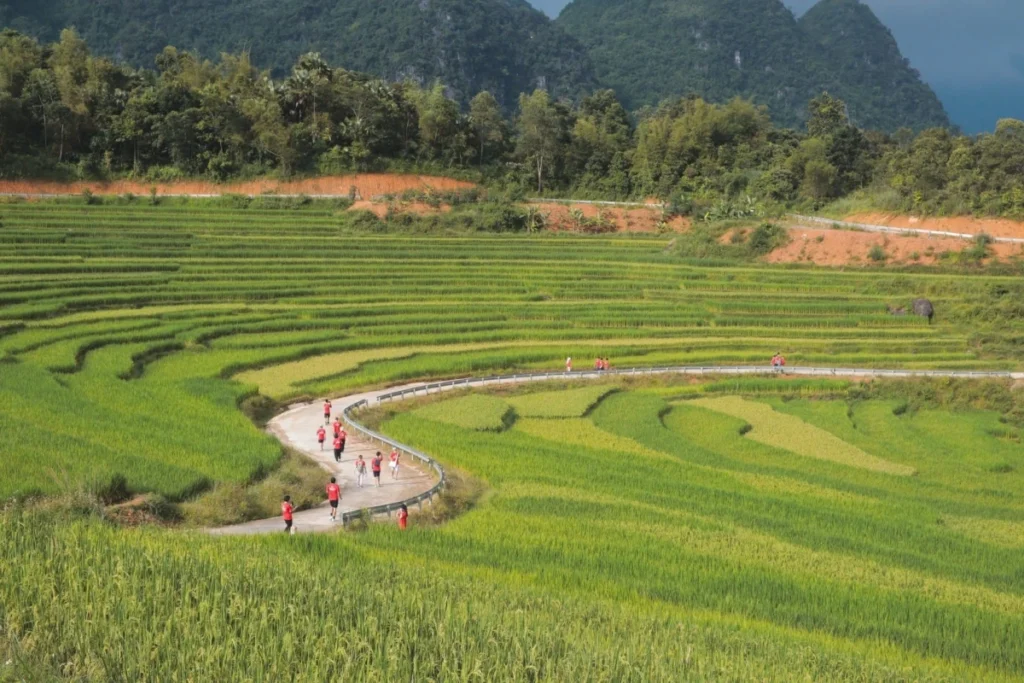
Cultural Do’s and Don’ts for Your Homestay Experience
| Do | Don’t |
| Greet elders with respect | Walk into rooms with shoes on |
| Accept food with both hands | Criticize local customs |
| Help out in daily chores if invited | Use excessive plastic or leave trash |
| Bring small gifts from your home country | Assume everyone speaks English |
Who Should Take a Vietnam Rural Homestay Tour?
- Solo Travelers: Looking to unplug, reconnect with nature, and meet people beyond tourism hotspots.
- Families: Wanting educational and bonding experiences for children through farming and nature.
- Cultural Explorers: Interested in Vietnam’s diverse ethnic communities, folklore, and traditional music.
- Eco-Conscious Tourists: Supporting low-impact travel and community-based tourism projects.
Travel Tips & Practical Advice
- Packing: Bring mosquito repellent, reusable water bottles, quick-dry clothes, and a power bank.
- Language: Learn a few basic Vietnamese greetings; translation apps can also help bridge gaps.
- Connectivity: Wi-Fi may be limited or unavailable in remote areas—perfect for a digital detox.
- Safety: Homestay hosts are very hospitable and communities are generally safe. Still, use common sense with valuables.
- Visa: Many nationalities can obtain a Vietnam e-visa online before traveling. Check your country’s requirements.
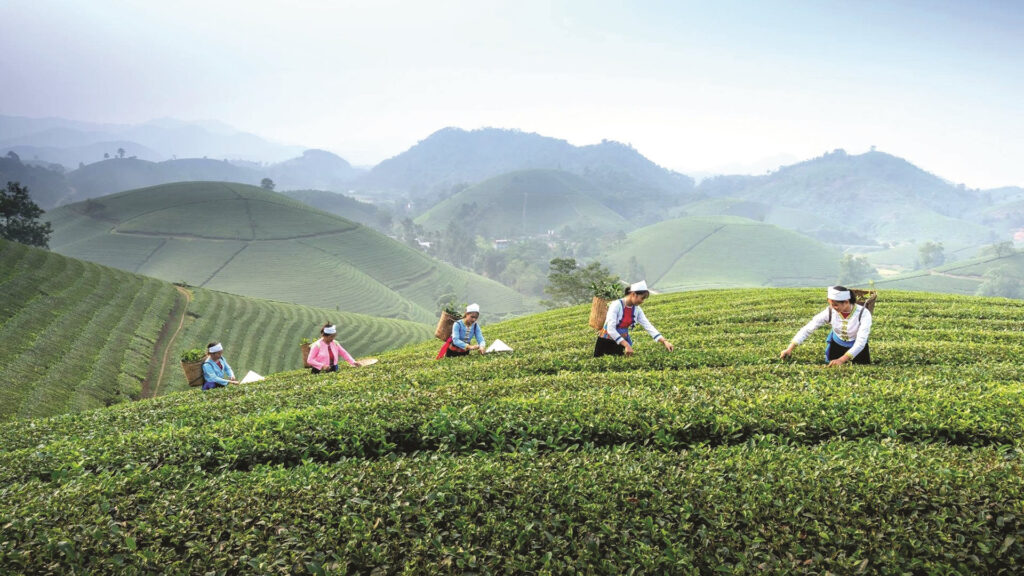
Supporting Sustainable Tourism in Vietnam
Vietnam rural homestay tours are about more than beautiful scenery—they’re about forging respectful connections. These experiences:
- Preserve intangible cultural heritage like traditional cooking, folk songs, and farming methods.
- Offer alternative income streams for farmers and artisans.
- Reduce pressure on overcrowded urban destinations.
- Encourage youth to stay in villages and contribute to their local economy instead of migrating to cities.
Projects like the VietHarvest AgriTour in Hanoi’s Giang Biên commune exemplify this shift. By transforming farming families into local hosts and storytellers, Vietnam’s rural tourism is now a cornerstone of sustainable economic development.
Final Thoughts
A Vietnam rural homestay tour invites you to experience Vietnam through the eyes and hearts of its people. It’s about simplicity, sincerity, and connection—whether you’re harvesting herbs in Hoi An, cycling through Mai Chau’s misty hills, or dining under lanterns beside the Mekong.
Instead of rushing from city to city, slow down. Stay a little longer. Laugh with your hosts. Learn their stories. And leave with something far more valuable than a souvenir—a memory rooted in real life with VietnamTour.
See more post: Mekong Delta Local Tour: Discover Authentic Life on the River

